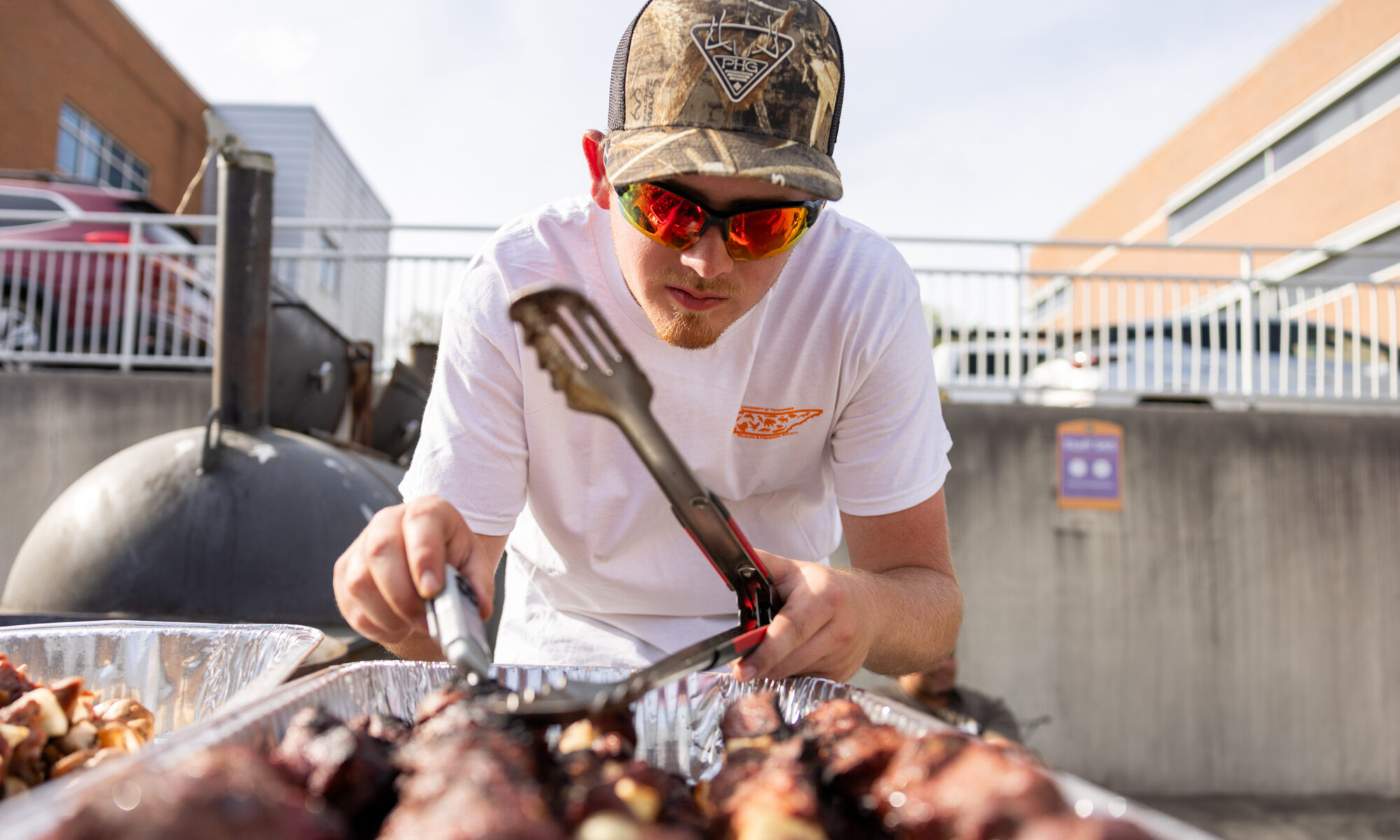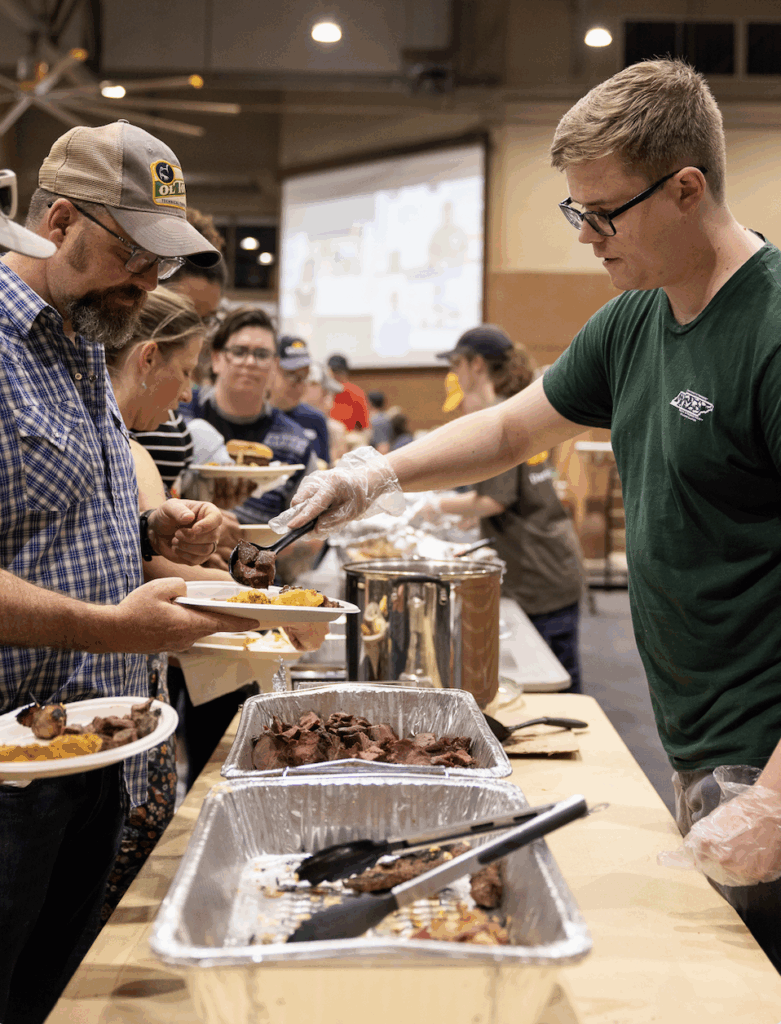
“It’s always a surprise to see what you’ll get.”
Justin Wolbert (BS and MS wildlife and fisheries science ’12, ’14) glances around Brehm Animal Science Arena as people form a long buffet line. The air smells like a barbecue restaurant or a backyard cookout, but the Wild Game Dinner menu features different fare than hot dogs and hamburgers. Alligator and venison gumbo, deer lasagna, and moose crackers are part of this year’s spread.
“A lot of people will be surprised by the flavor and how edible some of these animal meat products are,” Wolbert says. He stands in line with his daughter, son, and other people waiting to pile their plates.
A Long-Standing Tradition
The Wild Game Dinner, known for its untraditional fare, began in 1969. The menu changes each year, and past dinners served up bear, beaver, raccoon, squirrel, bass, and even threadfin shad. Wolbert, now a Tennessee Valley Authority fisheries biologist, got involved as an undergraduate in 2010 when the dinner was held in former Hollingsworth Auditorium. He says, “It’s changed over the years, and it’s fluctuated with the number of people who come and the bigger venue.”
One constant: the dinner remains the biggest fundraiser for the UT chapter of the Wildlife and Fisheries Society. Members started preparing for the April 5 dinner last year. “We got our first deer in November. It was from TWRA (Tennessee Wildlife Resources Agency). It was a nuisance deer. They are out there getting rid of them anyway, and it’s nice we can receive them,” Mary Jo Thomas says. Thomas and Erin Davis are wildlife and fisheries science students and the meat organizers for this year’s dinner.

Community Effort and Impact
In total, the society received 300 pounds of donated deer meat. Thomas and Davis processed 262 pounds in Davis’ garage with help from her wife, Kourtney. They say alumni working for state or federal agencies try to contribute. TWRA donated some deer and at least forty pounds of fish. Several TWRA employees also come each year to cook cobblers in their Dutch ovens. They call themselves the Dutch Oven Team.
“Having those people is very important. It takes a village,” Thomas says. The society starts preparing the food more than 24 hours before the dinner with help from alumni volunteers. Thomas adds, “Erin and I are not proficient in using a smoker, but a lot of the alumni are.”
Belle Jenkins, fisheries president of the society, says the community effort makes the dinner a success. “We have so many volunteers, and it’s nice to see my peers come together and work so hard on something we’re passionate about and something that can truly benefit us,” Jenkins says.
The dinner also provides a raffle and silent auction whose items this year included nature and wildlife artwork, a Tennessee-branded blanket and weighted goose, and hunting and fishing gear. The society is thankful to businesses, alumni, and people on Facebook Marketplace who donated the items.
Enhancing Student Opportunities
This year’s dinner raised more than $9,000. The society uses the proceeds to travel to wildlife and fisheries professional conferences without paying a dime. “That is huge for college students to be involved without having to worry about finances because I’m trying to get a job,” Thomas says.
“This can provide us more opportunities. With the federal budget cuts and firings, it’s going to be hard to get a job, and by getting more field work and more experience, we’re going to be more likely to get hired,” Jenkins says.
Wolbert echoes the importance, saying he tries to share his experience at those conferences. “Hopefully, I can provide a little bit of advice on their careers. Tell them what worked for me and what didn’t.”
Meanwhile, he supports the students at the dinner while reconnecting with other alumni and professors. “It allows me to catch up with people,” Wolbert says. “It’s also a great chance to try eating things you would never have the opportunity to consider.”
Society members hope the dinner teaches people about hunting, fishing, and conservation. “Maybe they never had deer before. They try it and say it’s really good. Hey, for the low price of a hunting license and firearm, you could fill your freezer,” Davis says. “A lot of people don’t understand hunters and anglers fund most of the wildlife conservation in this country. The bulk of most state agencies’ money comes from permit sales and license sales. People don’t understand that, but everybody loves food.”
Wolbert gives these closing words of advice to any Wild Game Dinner newcomers. “Give it a shot. Open your palate up a little bit and try it.”
Save the date for the next Wild Game Dinner on March 28, 2026 in the Agriculture and Natural Resources Building! Keep an eye on the University of Tennessee Wildlife and Fisheries Society’s Facebook page for more details and ticket information!
Explore More on
Features
MORE FROM THIS ISSUE

















